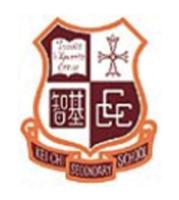| Language Policy |
Chinese is primarily used as the medium of instruction (MOI) in the junior secondary, supplemented by the English Extended Learning Activities (ELA) so as to maximise students' exposure to English. For senior secondary, the medium of instruction (MOI) is based on the needs of individual subjects. |
| Learning and Teaching Strategies |
Our teachers adopt an array of pedagogies with emphasis on lesson planning, post-lesson reflection, developing students' higher-order thinking skills, and promoting self-directed learning. Classrooms are equipped with multi-media facilities. Online learning platforms are used to facilitate student learning in all subjects. Our School also provides life-wide learning opportunities, such as overseas study tours. It is encouraging to see that the performance of our students in public examinations has been improving. |
| School-based curriculum |
1. Electives: 3X. Senior secondary students take 2 to 3 elective subjects, including the Mathematics Extended Part (M1) and the Applied Learning courses.<br> 2. Curriculum highlights: <br>Our curriculum offers students diversified learning experiences in various key learning areas, which aims to nurture their generic skills and positive life attitudes. The junior secondary curriculum focuses on building a good foundation in Chinese Language, English Language and Mathematics, while developing students' Information Literacy and cultivating their interests and motivation in reading through an array of reading programmes and events. The senior secondary curriculum offers eleven electives for students to choose according to their interests and abilities. To cater for individual learning needs, students can also take the Applied Learning courses offered by other institutions as an elective subject. In response to students' diversity, curriculum adaptations are made based on their needs and abilities while the teaching foci and depth are selectively adapted to facilitate interactive teaching. <br>Other measures include setting basic and challenging questions in coursework and assessments, small-class streaming, and conducting enhancement and remedial classes after school, at weekends, and during long holidays. |
| Approach to Catering for Learner Diversity |
Special arrangements for examinations and additional learning support are provided for students with special learning needs. Coursework scaffolding, differentiated teaching and lesson accommodation are integrated to encourage cooperative learning among students. |
| Approach to Integrated Education |
The Learning Support Committee consists of our vice principals, an educational psychologist, the SENCO, the SENST, a school-based speech therapist, teachers from different departments, and counsellors. Regular meetings are held to tailor-make individual development plans to support students with special education needs. Our School empowers students with special educational needs through engaging them in multimodal training courses and group activities, for example outsourced professional support sessions, study skills groups and self exploration groups. Our School also puts great emphasis on parent-school cooperation. Other than organizing regular seminars and workshops for parents, we hold regular individual conferences with our parents regularly so as to discuss and evaluate the learning and teaching strategies adopted for the students in need. Meanwhile, the School equips our teachers with skills to cater for the needs of our SEN students by coordinating integrated education training opportunities systematically for them. |
| Education Support for Non-Chinese Speaking (NCS) Students |
|
| Home-School Co-operation |
In building an ideal environment for teachers, parents and students to exchange their ideas, the Parent-Teacher Association (PTA) organizes various family activities. The PTA has set up an annual fund to support the schemes that recognise students' academic achievement, encourage extensive reading and promote leadership training. Parents have been actively engaged in school functions and volunteered themselves to render commendable services to the School and the community. The Parent Manager elected among parents shall uphold effective communications between parents and the IMC, advise on school-related matters, and channel understanding towards school developments. |
| School Ethos |
Our School is known for our culture of simplicity and rigorous discipline. We have always emphasized moral education and character building for our students. Our School actively seeks external resources to boost our students' self-esteem and resilience through various activities, including Morning Assemblies, Training Camps and Adventure-based Programmes. With bible truths as our cornerstone, we are determined to cultivate our students to anchor proper attitudes, values, and acceptance for people with different backgrounds. Students are positively encouraged to learn and develop their potentials to the fullest. The Graduates' Association offers a range of incentive schemes and scholarships to encourage our students to strive for their best development. |
| School Development Plan |
Major Concerns of the three-year School Development Plan (2023-2026) include<br>1. Building a learning-oriented campus.<br>2. Constructing a positive life for students. |
| Teacher Professional Training and Development |
Teachers are highly motivated in pursuing professional training and development, and attend workshops and seminars after school hours.<br>We also run various programmes and activities to support teacher professional development, namely the New Teacher Mentorship Programme, subject-based teacher sharing sessions, inter-school seminars and lesson study. |
| Life-wide Learning |
Our School provides approximately 50 extra-curricular activities including the Science Society, Visual Arts Society, Home Economics Society, Dance Club, School Choir, Instrumental Classes, Fencing Club, Rugby Team, Football Team, Basketball Team, Volleyball Team, Beach Volleyball Team, Junior Police Call, Girl Guides, Air Scout, Christian Fellowship, Community Service Club, Speech and Debate Society, School band, Theatre Art Club, etc. Among these activities, our School has repeatedly won awards in fencing, volleyball, school band contest and the Hong Kong Schools Music and Speech Festival. <br>We offer approximately sixteen service teams to enable our students to serve the community outside classrooms. With over a hundred co-curricular activities, like local and overseas study tours and educational camps, co-organized talks, community services and workshops with NGOs and PVOs, students can broaden their horizons, sharpen their talents, and develop their interests to the fullest. |
